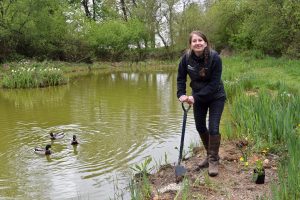‘The job list is never ending’ – marking International Women’s Day with ranger Laura Tong
March 7, 2024
As the National Park marks International Women’s Day this March, we caught up with ranger Laura Tong to get the inside track on her career as a ranger and what the National Park means to her.
What made you think of becoming a ranger?
As soon as I realised that this kind of job existed! I’ve always loved being outside, watching and learning about wildlife from my earliest childhood years.
I had my first experience of this job whilst completing work experience at school and I immediately knew I’d found my calling.
I found it a very tangible experience, I could see what I was doing was having a positive effect and that to me had a lot meaning and felt incredibly rewarding.
What’s it like being a ranger in the South Downs National Park?
This is such a good question because your job as a ranger is very much linked by the landscape, habitats and people that you work with and are surrounded by.
Here in the South Downs we are so lucky to have such a wide variety of habitats, it creates this amazing mosaic within the landscape.
This adds to the diversity of our work, whether it be working on chalk grassland, woodland, rivers, farmland or heathland – just to name a few!
There are also engagement activities with schools & local communities, there is fantastic partnership working with a whole array of different NGOs, public bodies and landowners, and there is both project management and practical hands on management too.
For me the diversity in the role is something that I love, no two days are ever the same and there is always something new to learn and discover.
Can you describe your typical day?
This really depends on the time of year.
At the moment it is winter, therefore we are making the most of this time of year to manage scrub and woodlands before bird nesting season starts in March.
This can be carried out with volunteer tasks, contractors or within our own ranger team.
A typical volunteer task day involves meeting our volunteers at the workshop, packing up the tools and heading to site where we could be working on a chalk grassland site to remove some (but not all) scrub.
A typical day will also almost always involve some very necessary admin and email checking.
What’s the best and most difficult part of the ranger job?
 As well as the variety within the job, one of the best parts of the job is working on projects that enable people to access the National Park and connect with nature.
As well as the variety within the job, one of the best parts of the job is working on projects that enable people to access the National Park and connect with nature.
It’s becoming more well known that being outside is so vital for our health & wellbeing and everyone has a right to access this amazing landscape.
As we cover large areas, the difficult part of the job is sometimes not having enough time to be able to have as much involvement in some projects as we’d like to.
The job list is never ending!
What’s been the highlight of your ranger career so far?
I think it has be finding some of the amazing otter footage on our wildlife cameras.
We knew otters were present from the signs on site, but to have otters and their cubs (who are highly secretively) just running around and playing together on this video footage was really special to see and to share that with others.
Why do you love the South Downs?
For me it’s home. I grew up nearby and its always been a significant area in my life to both visit and live in.
I find it a very warm landscape to be in, the mosaics of different habitats make it very interesting from a landscape and ecological point of view and there are some amazing views and idyllic walks just to top it off.
What does International Women’s Day mean to you?
For me this day is about equality, and recognising that our skills and qualities are not gender based and that anyone has the right to reach their maximum potential.
What would you say to any youngster thinking of becoming a ranger?
Firstly I would say “that’s amazing!”. Secondly, I would direct them to doing some volunteering – this is fantastic firsthand experience of what some of the job entails.
If you’re able to commit frequently to volunteering then that’s even better.
I would also suggest they look at relevant qualifications or apprenticeships that could further their knowledge and skill base.
And lastly I would suggest to get out and enjoy the outside and keep that interest ignited.
Is there anything else you’d like to add?
You don’t have to be a Ranger to help biodiversity or to enjoy being outside, anyone can (however small) make a positive difference and experience nature connection.
Even if its just a walk around a greenspace near to where you live there’s always something in nature to be inspired by.
